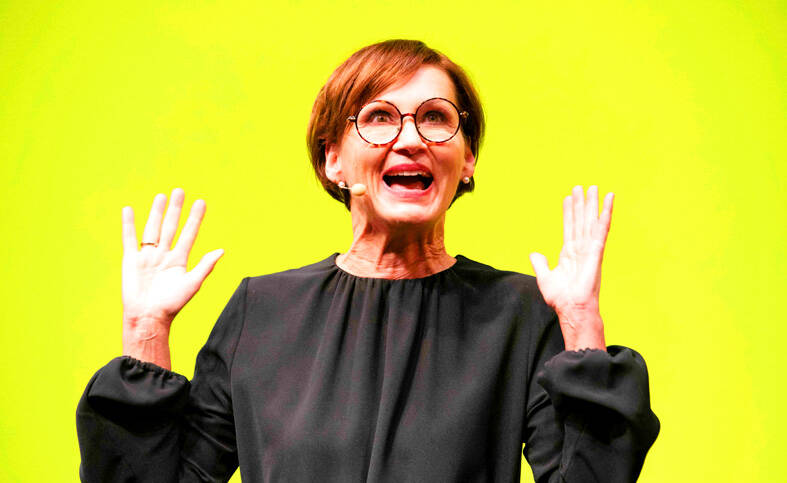A visit by German Minister of Education and Research Bettina Stark-Watzinger to Taiwan signals the normalization of relations between Taiwan and Germany, a German expert on cross-strait relations said.
Stark-Watzinger, who is scheduled to arrive in Taiwan today for a two-day visit, is the first German minister to visit the nation in 26 years.
“One could say that this is a return to normal after decades of self-censorship,” German Institute for International and Security Affairs senior fellow Gudrun Wacker told German newspaper Der Tagesspiegel.

Photo: AFP
As Germany and China increased interactions in economic and political fields after the 1990s, the European country abstained from engaging in exchanges with Taiwan that would aggravate Beijing, she said.
The paper called the visit “a journey of historical dimension,” while Die Zeit said it is “symbolic,” considering cross-strait tensions and China’s resentment toward visits by German parliamentarians since autumn last year.
“The aim of the trip is to strengthen and expand cooperation with Taiwan in science, research and education,” the German Ministry of Education and Research said, adding that “Germany and Taiwan share the same values and are committed to them: peace, freedom, human rights.”
The semiconductor industry would be the focus of the minister’s visit, as Taiwan is a global leader in the field and Taiwan Semiconductor Manufacturing Co is reportedly planning to set up its first European plant in Dresden, Germany, Der Tagesspiegel reported.
Stark-Watzinger is scheduled to meet with National Science and Technology Council Minister Wu Tsung-tsong (吳政忠), Minister of Education Pan Wen-chung (潘文忠) and Minister of Digital Affairs Audrey Tang (唐鳳) to discuss cooperation in the high-tech field, along with green hydrogen, battery research and educational cooperation, it said.
“The visit of the minister of science makes a lot of sense, because it is exactly the type of cooperation that we are striving for with Taiwan,” European Council on Foreign Relations Asia program director Janka Oertel said.
The trip could also help create “awareness in Germany that Taiwan is a place of freedom, democracy and innovation whose existence is in danger,” she added.
As high-ranking visits always provoke aggressive reactions from China, “ensuring Taiwan’s security, integrating it internationally and protecting it from violent annexation by China” are essential, Oertel said.
“Taiwan is a valued partner in every sense of the word — a model democracy in Asia that also behaves responsibly internationally,” Wacker said.
Boosting exchanges with Taiwan does not contradict the German “one China” policy, Wacker said, adding that Germany should signal to Beijing that “violent action against Taiwan would have a high price.”
The Chinese embassy in Berlin on Friday last week voiced opposition to the planned visit, calling on Germany to “adhere to the ‘one China’ principle without making any compromises,” the Editorial Network Germany reported.
Mutual ministerial visits are “completely normal,” and are in line with the German “one China” policy, the German Federal Foreign Office said on the same day.

Alain Robert, known as the "French Spider-Man," praised Alex Honnold as exceptionally well-prepared after the US climber completed a free solo ascent of Taipei 101 yesterday. Robert said Honnold's ascent of the 508m-tall skyscraper in just more than one-and-a-half hours without using safety ropes or equipment was a remarkable achievement. "This is my life," he said in an interview conducted in French, adding that he liked the feeling of being "on the edge of danger." The 63-year-old Frenchman climbed Taipei 101 using ropes in December 2004, taking about four hours to reach the top. On a one-to-10 scale of difficulty, Robert said Taipei 101

Nipah virus infection is to be officially listed as a category 5 notifiable infectious disease in Taiwan in March, while clinical treatment guidelines are being formulated, the Centers for Disease Control (CDC) said yesterday. With Nipah infections being reported in other countries and considering its relatively high fatality rate, the centers on Jan. 16 announced that it would be listed as a notifiable infectious disease to bolster the nation’s systematic early warning system and increase public awareness, the CDC said. Bangladesh reported four fatal cases last year in separate districts, with three linked to raw date palm sap consumption, CDC Epidemic Intelligence

Two Taiwanese prosecutors were questioned by Chinese security personnel at their hotel during a trip to China’s Henan Province this month, the Mainland Affairs Council (MAC) said yesterday. The officers had personal information on the prosecutors, including “when they were assigned to their posts, their work locations and job titles,” MAC Deputy Minister and spokesman Liang Wen-chieh (梁文傑) said. On top of asking about their agencies and positions, the officers also questioned the prosecutors about the Cross-Strait Joint Crime-Fighting and Judicial Mutual Assistance Agreement, a pact that serves as the framework for Taiwan-China cooperation on combating crime and providing judicial assistance, Liang

US climber Alex Honnold left Taiwan this morning a day after completing a free-solo ascent of Taipei 101, a feat that drew cheers from onlookers and gained widespread international attention. Honnold yesterday scaled the 101-story skyscraper without a rope or safety harness. The climb — the highest urban free-solo ascent ever attempted — took just more than 90 minutes and was streamed live on Netflix. It was covered by major international news outlets including CNN, the New York Times, the Guardian and the Wall Street Journal. As Honnold prepared to leave Taiwan today, he attracted a crowd when he and his wife, Sanni,